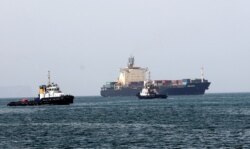Washington has announced plans to create a multinational military coalition to safeguard waters around Iran and Yemen, particularly shipping lanes in the Gulf. The development follows last month’s attacks on oil tankers and the downing of a U.S. drone, blamed on Iran. And this week Britain said Iran tried to intercept a British tanker to push it into its waters. Shipping and other experts are welcoming the U.S. plans for a coalition, as their concerns mount over rising military tensions in the Strait of Hormuz and the impact on global energy. Iran has long threatened to close the strategic strait through which almost a fifth of the world’s oil passes.
Jakob Larsen is responsible for maritime security for Copenhagen based-BIMCO, the world’s largest shipping association. He says shippers are watching the situation in the Gulf with “great concern.”
“First of all, for the safety of the seafarers who operate in this region and secondly, for the potential implications for the global economy and thereby the trade also in the region, but also globally," he said. "When we have security issues like this in a strategic chokepoint like the Strait of Hormuz or the Gulf of Oman, we see an increase in oil prices, fewer ship owners willing to go into the area; thereby, a reduction in the supply of shipping. And all is actually creating a negative effect in the global economy. And this also means a downward trend in shipping, in general, because what drives shipping is the global economy.”
The U.S. Special Envoy for Iran, Brian Hook, says that as many as 17 countries have been adversely affected by the recent tanker attacks, either directly or through crew, insurance or contracts, and an international force might hinder Iran or its surrogates from mounting further attacks. Larson says having a proactive security deterrent in the Gulf is important.
"If we just left things as they are, the chance of a repeat of the incidents what we saw both in Fujairah on the 12th of May where 4 tankers and the aircraft were attacked and then incidents on the 13th of June in the Gulf of Oman, we would probably see a repeat of that, unless of course the political situation changes completely," he said.
Suki Basi, of the London-based risk management consultancy Russell Group, says about $554 billion worth of trade, mainly oil and gas, passes through the Straits of Hormuz yearly. Disruption there could cost the biggest trader, Saudi Arabia, three-and-a-half billion dollars a week but also negatively impact many Asian shippers. While he welcomes the U.S. plan, he says care must be taken.
"The Straits of Hormuz are actually very narrow. It’s only 2-lanes. So ships protecting ships heightens tensions in Iran because those ships will be going very close to the Iranian shoreline," Basi said.
BIMCO’s Larsen acknowledges the challenge.
"If countries do send naval vessels to the area, quite a high degree of coordination would be needed just to avoid friendly warships firing on each other. Military ships will have two roles," he said. "They will, of course, help build a picture of what exactly is going on and, in the event, a vessel is attacked, they will be able to track the perpetrator and, if possible, intercept and neutralize the perpetrator. The second role would be the instant response, so maintaining an overview of the area and then being prepared to respond to a security incident. "
Experts agree that the last thing the Gulf region needs now is an armed conflict. They hope the international naval force can keep its critical waterways and shipping lanes safe.












